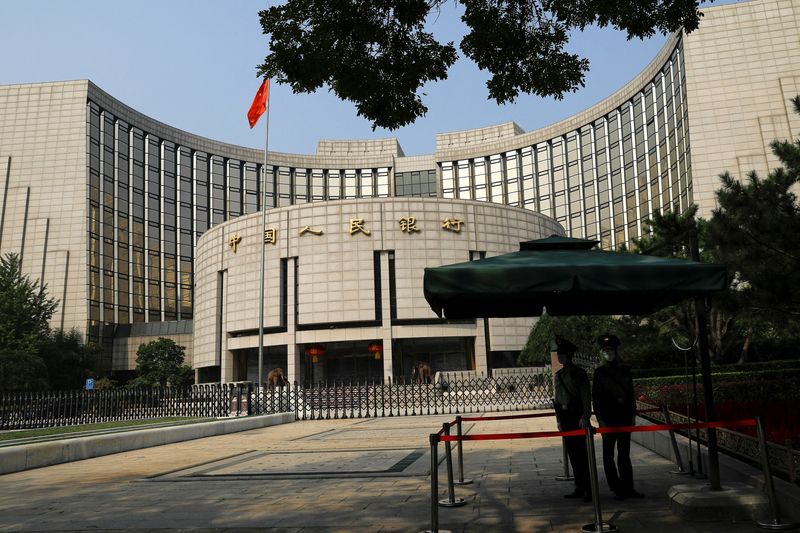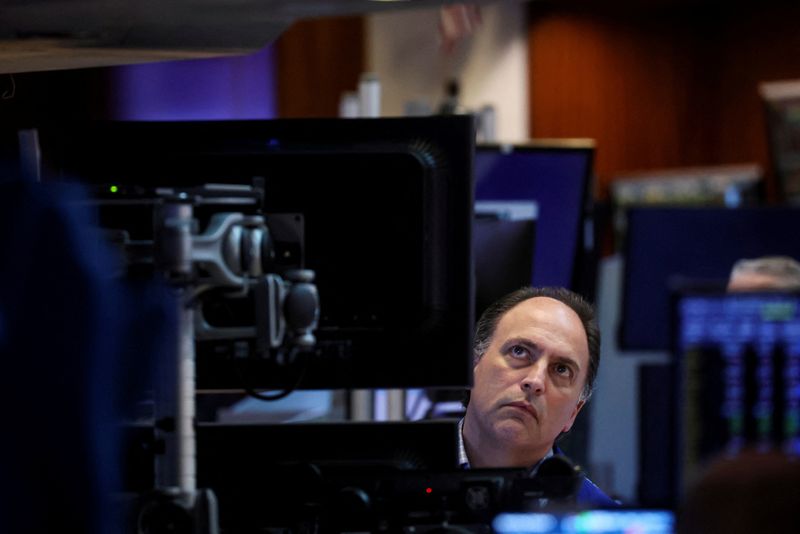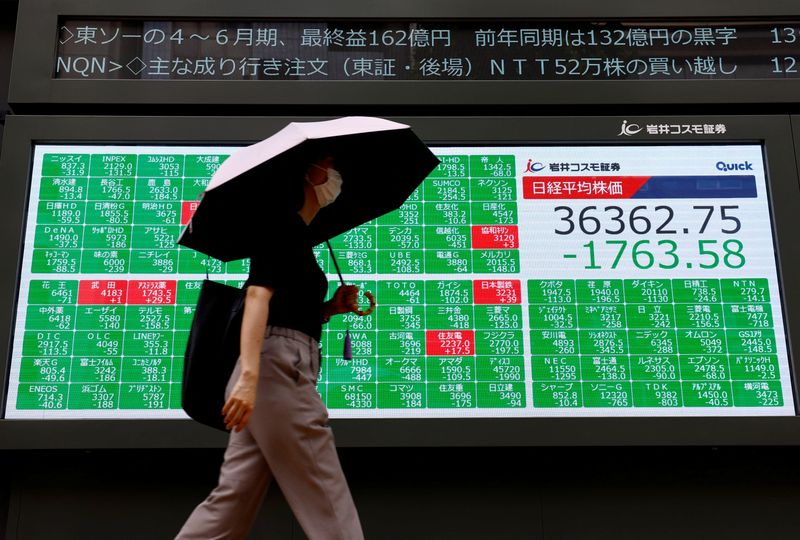Select Language

SHANGHAI (Reuters) - China's central bank rolled over maturing medium-term loans and injected cash through its liquidity instruments on Monday, underlining market expectations for further easing as the economy struggles to gain traction.
The People's Bank of China (PBOC) said it was keeping the rate on 300 billion yuan ($42.11 billion) worth of one-year medium-term lending facility (MLF) loans to some financial institutions at 2.30%, unchanged from the previous operation.
And it injected another 471 billion yuan through seven-day reverse repos while keeping borrowing costs unchanged at 1.70%.
"Today's outcome adds to expectation for a near-term reserve requirement ratio (RRR) cut," said Frances Cheung, head of FX and rates strategy at OCBC Bank.
"Meanwhile, as U.S. rates fell further, there may also be renewed expectations for an interest rate cut (in China)."
China is struggling with a prolonged property crisis that has curbed investment and dented consumer demand.
Monday's reverse repo operation was meant to "keep month-end banking system liquidity conditions reasonably ample," the central bank said in an online statement.
A batch of 401 billion yuan worth of MLF loans was due earlier this month, when the PBOC said it would postpone the loan rollover.
The postponement and the sequence of a string of key interest rate cuts last month suggested that the central bank has changed its monetary policy framework, market watchers said, shifting the short-term rate to being the main signal guiding markets.
OCBC's Cheung expected the difference in yields between 5-year and 30-year, and 2-year and 30-year China government bond yields, to steepen.
PBOC Governor Pan Gongsheng, in remarks published in state media on Saturday, said the central bank would adhere to supportive monetary policy to guide reasonable growth in credit lending and help the world's second-largest economy.
On Friday, Federal Reserve Chair Jerome Powell made it clear the U.S. central bank would not shy away from pivoting to interest rate cuts in the final weeks of a presidential election campaign and that protecting the job market was now its top priority.
($1 = 7.1244 Chinese yuan)

Investing.com -- The rally in U.S. markets will be tested this week when earnings from chipmaking giant Nvidia (NASDAQ:NVDA) are released. U.S. inflation data will likely underline expectations for long awaited rate cuts, while the Eurozone and Australia are also to release inflation data that will inform the trajectory of interest rates. Here's your look at what's happening in markets for the week ahead.
1. Nvidia results
Investor enthusiasm for artificial intelligence could be tested when Nvidia reports earnings after the close on Wednesday.
The earnings report along with guidance on whether it expects corporate investments in AI to continue, could be a key inflection point for market sentiment heading into what is historically a volatile time of the year.
Nvidia stock is up some 150% year-to-date, accounting for around a quarter of the S&P 500’s 17% year-to-date gain. But the stunning, multi-year run and AI-mania have also drawn comparisons to the dot-com craze that imploded more than two decades ago.
The results come at the end of an earnings season during which investors have taken a less forgiving view of big tech companies whose earnings failed to justify rich valuations or prodigious spending on AI. Examples include Microsoft (NASDAQ:MSFT), Tesla (NASDAQ:TSLA) and Alphabet (NASDAQ:GOOGL), whose shares are all down since their July reports.
2. U.S. data
The highlight of the economic calendar will be Friday's Personal Consumption Expenditures (PCE) price index, the Federal Reserve’s preferred inflation yardstick.
Speaking at the Fed’s annual Jackson Hole symposium on Friday, Fed Chair Jerome Powell acknowledged recent progress on inflation and said that “the time has come for policy to adjust.”
"We do not see or welcome further weakening in labor market conditions," Powell added in a speech that appeared to all but guarantee a rate cut at next month's policy meeting, which would be the first such cut in over four years.
The economic calendar also includes a report on durable goods orders on Monday and revised second-quarter GDP figures on Thursday along with the weekly report on initial jobless claims.
3. Eurozone inflation
Eurozone inflation data for August, due for release on Friday, will be pivotal in shaping the European Central Bank’s decision on interest rates for September.
This report, which follows national releases beginning on Thursday, comes after a small but unexpected uptick in inflation in July, signalling challenges in bringing inflation under control.
While headline inflation is expected to ease, partly due to falling oil prices, attention will remain on core inflation and the services sector, where price increases have proven more persistent.
Any upside surprises in the data could prompt caution, especially as traders have increased their expectations for an ECB rate cut in recent weeks.
Market expectations are heavily tilted towards a 25-basis point rate cut on September 12, with a high probability of additional cuts by the end of the year.
4. Australia inflation
Wednesday's July inflation numbers could show headline inflation pulling back into the Reserve Bank of Australia’s 2-3% target band for the first time in three years.
Any indication that inflationary pressures are easing could intensify scrutiny on the central bank, seen as a global outlier for its reluctance to cut rates while many other central banks have embarked on, or are contemplating, easing cycles.
Investors are also looking to Wednesday’s data to potentially offer some relief to consumer sentiment, which has been weighed down by high borrowing costs.
Elsewhere, Tokyo’s August inflation report, due for release on Friday, may provide further clues into Japan's monetary policy outlook.
5. Gold
Gold has reached consecutive record highs since 2022 and has surged over 20% so far this year, with $3,000 an ounce now within sight.
The precious metal, traditionally viewed as a safe haven during periods of heightened security risks and political and economic instability, has benefitted from several converging factors.
Russia’s invasion of Ukraine in February 2022 triggered an initial rally in gold prices. Rising commodity prices and subsequent inflation, which erodes the value of fiat currencies, further supported the uptrend.
Ongoing tensions in the Middle East and uncertainty surrounding the upcoming U.S. Presidential election have also contributed to gold’s gains. Additionally, expectations of U.S. interest rate cuts are pressuring the dollar, making gold more attractive as it typically has an inverse relationship with the U.S. currency.
However, gold investors should be cautious, as markets often experience corrections with the adage "nothing goes up in a straight line," reflecting the tendency to "buy the rumour, sell the fact."
--Reuters contributed reporting

By Ingrid Melander and Guy Faulconbridge
PARIS/MOSCOW (Reuters) -Pavel Durov, the Russian-born billionaire founder and owner of the Telegram messaging app, was arrested at Le Bourget airport outside Paris shortly after landing on a private jet late on Saturday and placed in custody, three sources told Reuters.
The arrest of the 39-year-old technology billionaire prompted on Sunday a warning from Moscow to Paris that he should be accorded his rights and criticism from X owner Elon Musk who said that free speech in Europe was under attack.
There was no official confirmation from France of the arrest, but two French police sources and one Russian source who spoke on condition of anonymity said that Durov was arrested shortly after arriving at Le Bourget airport on a private jet from Azerbaijan.
One of the two French police sources said that ahead of the jet's arrival, police had spotted he was on the passenger list and moved to arrest him because he was the subject of an arrest warrant in France.
"Telegram abides by EU laws, including the Digital Services Act — its moderation is within industry standards and constantly improving," Telegram said in a statement on the arrest.
"Telegram's CEO Pavel Durov has nothing to hide and travels frequently in Europe," it said. "It is absurd to claim that a platform or its owner are responsible for abuse of that platform."
Durov, who has dual French and United Arab Emirates citizenship, was arrested as part of a preliminary police investigation into allegedly allowing a wide range of crimes due to a lack of moderators on Telegram and a lack of cooperation with police, a third French police source said.
A cybersecurity gendarmerie unit and France's national anti-fraud police unit are leading the investigation, that source said, adding that the investigative judge was specialised in organised crime.
"We’re awaiting a prompt resolution of this situation. Telegram is with you all," Telegram said.
The French Interior Ministry, police and Paris prosecutor's office had no comment.
Russian lawmaker Maria Butina, who spent 15 months in U.S. prison for acting as an unregistered Russian agent, said Durov "is a political prisoner - a victim of a witch-hunt by the West." Durov's arrest led news bulletins in Russia.
Telegram, based in Dubai, was founded by Durov, who left Russia in 2014 after he refused to comply with demands to shut down opposition communities on his VK social media platform, which he has sold.
The encrypted application, with close to 1 billion users, is particularly influential in Russia, Ukraine and the republics of the former Soviet Union. It is ranked as one of the major social media platforms after Facebook (NASDAQ:META), YouTube, WhatsApp, Instagram, TikTok and WeChat.
TELEGRAM'S ORIGIN AND INFLUENCE
Durov, who is estimated by Forbes to have a fortune of $15.5 billion, said in April some governments had sought to pressure him, but the app should remain a neutral platform and not a "player in geopolitics".
Durov came up with the idea for an encrypted messaging app while facing pressure in Russia. His younger brother, Nikolai, designed the encryption.
"I would rather be free than to take orders from anyone," Durov said in April about his exit from Russia and search for a home for his company, which included stints in Berlin, London, Singapore and San Francisco.
After Russia launched its invasion of Ukraine in 2022, Telegram has become the main source of unfiltered - and sometimes graphic and misleading - content from both sides about the war and the politics surrounding the conflict.
The platform has become what some analysts call "a virtual battlefield" for the war, used heavily by Ukraine's President Volodymyr Zelenskiy and his officials, as well as the Russian government.
Russia's foreign ministry said it had sent a note to Paris demanding access to Durov, although it said that he had French citizenship.
Former Russian President Dmitry Medvedev said that Durov had misjudged by fleeing Russia and thinking that he would never have to cooperate with the security services abroad.
Medvedev, who regularly uses Telegram to criticise and insult the West, said Durov wanted to be a "brilliant 'man of the world' who lives wonderfully without a Motherland."
"He miscalculated," Medvedev said. "For all our common enemies now, he is Russian – and therefore unpredictable and dangerous."
Russia began blocking Telegram in 2018 after the app refused to comply with a court order granting state security services access to its users' encrypted messages.
The action interrupted many third-party services, but had little effect on the availability of Telegram there. The ban order, however, sparked mass protests in Moscow and criticism from NGOs.
PLATFORM UNDER SCRUTINY
Telegram says it "is committed to protecting user privacy and human rights such as freedom of speech and assembly."
Durov has previously accused U.S. law enforcement agencies such as the FBI of seeking to get a backdoor into the platform. The FBI has not commented on those allegations.
Telegram's increasing popularity, however, has prompted scrutiny from several countries in Europe, including France, on security and data breach concerns.
Musk, billionaire owner of X, the social media platform formerly known as Twitter, said after reports of Durov's detention: "It's 2030 in Europe and you’re being executed for liking a meme."
Outside the French embassy in Moscow, a lone protester held a sign reading: "Liberté pour Pavel Durov".

LONDON (Reuters) - The latest earnings from AI darling Nvidia (NASDAQ:NVDA) and key inflation numbers in the euro area and Australia should keep markets busy in the coming week.
Gold's relentless climb to record highs and a dollar under pressure as U.S. rate cut speculation builds are also in investors' sights.
Here's your guide to the week ahead in financial markets from Rae Wee in Singapore, Sruthi Shankar in Bangalore, Ira Iosebashvili in New York, Yoruk Bahceli in Amsterdam, and Pratima Desai in London.
1/ NVIDIA, YOU'RE UP
Investor enthusiasm for artificial intelligence could be tested when chipmaker Nvidia reports earnings on Aug. 28.
Nvidia’s chips are seen as the gold standard in the AI-space and its shares are up around 150% this year, helping to power the S&P 500 to record highs.
But the stock's stunning, multi-year run and the AI-mania have also drawn comparisons to the dot-com craze that imploded more than two decades ago.
Investors’ reaction to disappointing results from megacap names such as Alphabet (NASDAQ:GOOGL) and Tesla (NASDAQ:TSLA) last month suggests markets may not be in a forgiving mood, especially when valuations for many companies in the sector are stretched.
Data highlights meanwhile include Friday's U.S. Personal Consumption Expenditures (PCE) price index, a key inflation gauge tracked by the Federal Reserve.
2/ WHEN SEPTEMBER COMES
August euro zone inflation numbers on Friday will be key to European Central Bank policymakers deciding whether or not to cut rates in September.
The data, preceded by national releases starting on Thursday, follows a small but unexpected rise in July, highlighting a bumpy last mile in curbing inflation.
Headline inflation may ease as oil prices have fallen, but focus will remain on the core figure and the dominant services sector, where price growth remains stickier.
Any upside surprises may warrant caution, as traders have ramped up ECB rate cut bets in recent weeks. Focus has turned to growth risks, but euro zone business activity showed surprising strength in August.
Traders fully price in another 25 basis point rate cut on Sept. 12, and see a high chance of two more moves after that by year-end.
3/ HIGH STAKES
The stakes are high for the Reserve Bank of Australia (RBA), which has insisted that interest rates need to stay restrictive for an "extended period" since underlying inflation remains too high for comfort.
Wednesday's July inflation numbers could show headline inflation diving back into the RBA's 2-3% target band for the first time in three years.
And any signs that inflation pressures are abating could pile pressure on the central bank. It has become an outlier globally with a reluctance to lower rates while many peers look to kick off, or have already begun, easing cycles.
Investors are also hoping that Wednesday's data could provide some relief to consumer sentiment, which has taken a hit from the weight of steep borrowing costs.
Elsewhere, Tokyo's August inflation report on Friday potentially offers further clues on Japan's rate outlook.
4/ EURO BULLS
The euro is at its highest this year against the dollar, benefiting from recent ructions in global markets.

SINGAPORE (Reuters) - Singapore's key consumer price gauge rose 2.5% in July from a year earlier, the smallest increase since February 2022, official data showed on Friday.
The core inflation rate - which excludes private road transport and accommodation costs - was lower than a 2.9% forecast in a Reuters poll, and compared with the 2.9% seen in June.
It was the smallest annual increase in the core price index since February 2022, when it rose 2.2%.
Headline inflation in February was up 2.4% from the same month last year, lower than the 2.5% forecast in the poll. It was the lowest headline inflation rate since August 2021.
Inflation in the Asian financial hub has cooled from a peak of 5.5% in early 2023, but only dropped below 3% in June.
The Monetary Authority of Singapore expects core inflation to ease more significantly in the final quarter of this year. It has forecast core inflation at 2.5% to 3.5% this year.
Last week, the trade ministry adjusted its GDP growth forecast range for 2024 to 2.0% to 3.0%, from 1.0% to 3.0% previously after the economy posted stronger-than-expected second quarter growth.

By Stella Qiu
SYDNEY (Reuters) - Asian shares stuttered on Friday while the dollar rebounded from one-year lows as investors were cautious ahead of a speech by the world's most powerful central banker with markets looking for confirmation U.S. rate cuts would start in September.
The Japanese yen gained 0.3% to 145.77 per dollar while bond yields edged up as Bank of Japan Kazuo Ueda spoke before lawmakers.
Traders see very little chance that the BOJ could hike rates in October after the recent sell-off, but Ueda stuck to the script by saying the central bank stood ready to raise rates if the economy and prices move in line with its forecast.
Data out early in the day showed Japan's core inflation accelerated for a third straight month, but a slowdown in demand-drive price gains suggest no urgency for any immediate rate hikes.
Krishna Bhimavarapu, APAC economist at State Street (NYSE:STT) Global Advisors, expects the stronger yen and reintroduction of energy subsidies to slow inflation in the near-term.
"If the data evolves as we expect, it could mean that the next BOJ hike may not come until December as fears of rapid inflation ease to an extent."
On Friday, MSCI's broadest index of Asia-Pacific shares outside Japan fell 0.4% but were headed for a weekly gain of 0.6%. The Nikkei was flat near three-week highs.
China's blue chips gained 0.3%, although Hong Kong's Hang Seng fell 0.4% while South Korea dropped 0.5%.
Overnight, Wall Street fell as sentiment turned cautious ahead of the Federal Reserve Chair Jerome Powell's speech in Jackson Hole. Three Fed speakers on Thursday alluded to a rate cut in September, with them voicing support for a "slow and methodical" approach.
Taken together with surveys showing the U.S. economy still growing at a healthy pace, markets slightly pared back the chance of an outsized half-point cut in September to 24%, from 38% a day earlier. A quarter-point reduction is fully priced in.
Robert Carnell, regional head of research, Asia-Pacific, at ING, noted there was still scope for Powell's speech to excite or disappoint markets given the market pricing, but much will depend on data.
"As any decision that deviates from market pricing will rest on as yet unknown data, it is hard to see how Powell can commit to much beyond some easing of some sort in September, and even then, only barring data accidents," said Carnell.
Treasury yields slipped a little on Friday, having gained overnight for the first time in five sessions. Ten-year yields fell 2 basis points to 3.8426% in Asia and were down 5 bps for the week.
Two-year yields also dropped 3 bps to 3.9845% and were down 8 bps for the week.
Declining yields pressured the dollar to one-year lows, although it did get some respite from selling pressure overnight. The euro came off its one-year high at $1.1119, with major resistance seen at $1.1139.
Wall Street futures rose between 0.2%-0.4% and commodities looked set to end the week lower.
Brent crude futures were flat at $76.04 a barrel, although they are down more than 3% for the week as swelling U.S. crude stocks and a weakening demand outlook in China have raised pessimism. [O/R]
Gold prices are 0.7% lower in the week to $2,488.13 an ounce, having hit a record high of $2,531.6 just on Tuesday.

By Promit Mukherjee
OTTAWA (Reuters) - Canada's economy could shrink by billions of dollars this year if a rail stoppage that began on Thursday continues for weeks, and the knock-on effects would swell jobless numbers and consumer prices, economists and analysts warned.
However, the economic impact could be minimal if the stoppage lasts less than a week, they said.
Canada's two biggest freight rail operators Canadian National Railway (TSX:CNR) and Canadian Pacific (NYSE:CP) Kansas City locked out workers affiliated with the Teamsters union on Thursday, after both companies and the union failed to conclude labor deals.
"If you have a stoppage that is extended, that drags out, that could be really devastating," said Pedro Antunes, chief economist at the Conference Board of Canada, an economic think-tank.
A two-week rail strike would result in a $3-billion loss in nominal GDP this year, and a four-week strike could lower GDP by nearly $10 billion in 2024, he said, adding it could result in 49,000 job losses in the year.
The unprecedented simultaneous stoppage of the majority of Canada's rail freight is "growth-negative and inflation-positive," said Robert Kavcic, senior economist with BMO Capital Markets.
Kavcic expects that the stoppage could shave around 0.1 percentage points each week from economic growth, "but the impact could build the longer it drags on," he warned. This translates into a weekly impact of over $2 billion in nominal GDP terms.
Canada's economic growth has been lackluster this year as consumers and businesses reeled under near 23-year-high interest rates before the Bank of Canada started trimming its policy rate in June.
After cutting interest rates in July for a second straight month, Governor Tiff Macklem hinted at shifting the bank's focus to boosting the economy rather than suppressing inflation.
First-quarter GDP growth was 1.7%, far below the bank's April forecast, and weakness in the economy made it scale down growth expectations this year to 1.2% from 1.5% in April.
Economists have said that rising unemployment, which hit a 30-month high last month, and a wave of around C$300 billion ($220.78 billion) in mortgage renewals next year, will keep economic conditions strained.
Amid all this, a protracted rail stoppage could lead to economic inertia, warned economists.
Derek Holt, head of capital markets economics at Scotiabank said that a one- to three-week strike could have a 0.1%-0.2% monthly drag on GDP, but its impact would rise exponentially with each passing day beyond three weeks.
The world's second-largest country by area, Canada relies heavily on CN and CPKC to ship grain, fertilizers and other commodities, along with manufactured goods such as chemicals and automobiles.
The total rail freight cargo hauled annually in Canada tops C$380 billion, with the vast majority moving on CN and CPKC's tracks.
Randall Bartlett, senior director of Canadian economics at Desjardins, said past rail stoppages have not usually continued beyond a week or 10 days.
"If it is short-lived like (in the) past, the impact is minimal," he said, adding a stoppage would do significant economic damage if it continues beyond a few weeks.
($1 = 1.3588 Canadian dollars)

(Reuters) - British consumer confidence held at an almost three-year high in August, bolstered by improving sentiment around personal finances and major purchases, according to a survey on Friday that added to positive signals in the wider economy.
The GfK Consumer Confidence Index, Britain's longest-running gauge of economic morale among members of the public, was steady in August at -13, matching July's 34-month high. A Reuters poll of economists had pointed to a reading of -12.
The survey follows mostly positive data from companies since Prime Minister Keir Starmer's Labour Party won a landslide election victory last month. Business surveys put the economy on course for solid growth in the second half of 2024.
The survey's measure of enthusiasm for major purchases rose to its highest level since January 2022, while the outlook for personal finances also notched higher.
"This more positive outlook may be due to a mortgage-friendly interest rate cut at the beginning of August, and hopes of more to come," said Joe Staton, client strategy director at market research company GfK.
The BoE cut borrowing costs from a 16-year high of 5.25% earlier this month but Governor Andrew Bailey and other top officials have signalled they might not follow that up with rapid further reductions in rates.
Investors were assigning a less than 30% chance of a September rate cut on Thursday.
A Reuters poll of economists published on Wednesday suggested the BoE will cut interest rates just once more this year, in November.
The GfK report's gauges of past and future economic sentiment cooled, however.

By Farah Master and Laurie Chen
HONG KONG/BEIJING (Reuters) - Mary Meng is so busy and stressed working for a Chinese tech company in Shanghai that she can't imagine having a second child.
"The work pressure is such that you don't even have any time to spend with your child," said the 37-year-old mother of a primary school-aged boy. "How can I think about taking care of two children? I have no idea."
That resonates with urban residents anywhere. But given the pace of population decline and ageing in China, the impact of the fast-paced, expensive city life on birth rates should be treated with more urgency by Beijing, demographers say.
China is rapidly running out of mothers. The number of women of reproductive age, defined by the United Nations as 15-to-49, is set to drop by more than two-thirds to under 100 million by the end of the century.
At a twice-a-decade top political gathering last month, China announced plans to build a "birth-friendly society" - pledging to implement measures long-called for by population experts, such as lowering childcare and education costs.
But, to the despair of the same experts, Beijing also vowed to encourage more people into urban areas.
This policy aims to increase housing demand to prop up the crisis-hit property sector, and revive flagging economic growth through productivity gains and stronger consumption. Urban residents typically produce and buy higher value-added goods and services than their rural counterparts.
But the fresh urbanisation push overlooks basic demographic theory. In the cities, people have fewer children due to high housing costs, limited space, expensive education, and because they spend most of their day at work.
Couple infertility rates in China have also risen from 2% in the 1980s to 18%, versus around 15% globally - with doctors blaming the rise on factors such as stress related to urban jobs and industrial pollution.
Fertility rates in China's rural areas are slightly higher at 1.54 versus the national average of 1.3 in 2020, according to the latest breakdown from China's top economic planner, while Shanghai's fertility rate in 2023 was 0.6 versus 1.1 nationally.
Authorities are "foolishly" driving young people "to the most birth-unfriendly big cities, which will lead to a continued decline in fertility and exacerbate the ageing crisis," said Yi Fuxian, a demographer at the University of Wisconsin-Madison.
"The suppression of fertility rates by population density is a biological law."
This phenomenon has been most evident in east Asia. Japan, South Korea and Taiwan urbanised and industrialised at a faster pace than most other economies post-World War Two. They also have the lowest fertility rates globally.
While China's birth rates are also very low after decades of a strict one-child policy, not all is lost.
At 65%, its urbanisation rate is lower than the 80-90% rates in Japan or South Korea - and this could give it room for manoeuvre, demographers say.
Improving rural living standards by providing better public services or liberalising land rights would have a more sustainable impact on economic growth than continuing urbanisation as they could improve birth rates, they say.
"The population size is always a multiplier" in the economy, said Samir KC, professor at the Asian Demographic Research Institute at Shanghai University.
'JUST SURVIVAL'
To have a stable population, countries need fertility rates of 2.1. That means that for every woman like Meng, who only raises one child, another would need to have three.
Poppy Yu, 21, who works at film production company in Beijing six or seven days a week, wants none.
"I don’t have the money or energy," Yu said.
China's "birth-friendly society" vision entails bringing down costs of parenting and education, lengthening parental leave, upgrading maternity and paediatric care and boosting child subsidies and tax deductions.
Many countries offer such incentives. But those with successful birth policies - such as France or Sweden - stand out through greater gender equality, stronger labour rights and robust social welfare.
Reducing childcare costs does not work on its own "and instead promotes a certain set of family values that demand that women take domestic responsibilities," said Yun Zhou, demographer at the University of Michigan.
Meng believes no policy would work until Chinese people start hoping again for a better life, financially.
"Now everyone thinks there is no prospect at all," she said. "No matter how hard you work, it is just survival."
($1 = 7.1469 Chinese yuan renminbi)

By Indradip Ghosh
BENGALURU (Reuters) - India's business activity extended its robust growth streak in August as a stronger services industry offset a slight slowing in manufacturing expansion, according to a survey that indicated price pressures also were easing.
Those findings suggest India will hold on to its title of fastest-growing major economy over coming quarters despite expectations of a slowdown in the global economy.
HSBC's flash India Composite Purchasing Managers' Index, compiled by S&P Global, dipped slightly to 60.5 in July from last month's final reading of 60.7, in line with a Reuters poll forecast.
August marked over three years of expansion, the longest such run since June 2013. The 50-level separates growth from contraction.
"India's flash composite PMI slipped slightly in August, though it remained significantly higher than the historical average," noted Pranjul Bhandari, chief India economist at HSBC.
"Although new order growth for the manufacturing sector slowed to the weakest since February, the pace of expansion remained sharp, indicating continued strong demand and favourable market conditions."
The flash services PMI index rose to 60.4 this month from 60.3 in July, while a preliminary manufacturing PMI showed strong growth, albeit slightly weaker than last month. It declined to 57.9 from 58.1.
Although growth in overall demand slowed to a three-month low in August, it remained robust. However, exports expanded at the slowest rate since April, indicating weak global demand.
Overall input costs increased at their weakest pace since February and output prices rose at a slower rate compared to last month.
Even so, prices charged on manufactured goods surged at the fastest in nearly 11 years.
India's retail inflation fell in July to a near five-year low, largely due to a high-base effect, suggesting the slower pace of price rises was temporary and the Reserve Bank of India needs to be cautious.
Concerns around inflation and competition led business confidence for the coming 12 months to wane in August.

